
MBTAAnalysis: A look inside the MBTA
0 Comments
/
The MBTA shuttles over a million passengers a day around Greater…
 https://pioneerinstitute.org/wp-content/uploads/CloseupClock-1.jpg
739
1244
Mary Connaughton
https://pioneerinstitute.org/wp-content/uploads/logo_440x96.png
Mary Connaughton2017-02-20 12:34:192017-02-21 09:47:58The Clock is Ticking…….
https://pioneerinstitute.org/wp-content/uploads/CloseupClock-1.jpg
739
1244
Mary Connaughton
https://pioneerinstitute.org/wp-content/uploads/logo_440x96.png
Mary Connaughton2017-02-20 12:34:192017-02-21 09:47:58The Clock is Ticking…….
Pioneer Institute Study Calls for Reforms to Ensure that Pharmacy Benefit Manager Practices Benefit Patients, Healthcare Payers
Congress likely to take up PBM reform early this year; Pioneer Institute Calls for PBM’s to be more transparent

Pioneer Institute: 340B Hospitals Does Not Necessarily Translate to Charity Care
Review of Becker’s List of Health Systems with Strong Finances…
New Online Tool Tracks MA Hospital Revenue from Commercial Sources
A new online tool from Pioneer Institute shows a gradual increase in non-commercial (public payer) revenue at Massachusetts hospitals and also reveals a strong relationship between the hospitals with the highest commercial revenue and those with the highest relative prices.

Telehealth Progress Slowed in 2023
A new report by Cicero Institute, Pioneer Institute, and Reason Foundation reveals worrying stagnation in state-level telehealth expansion efforts in 2023, with only a few exceptions. Progress made during the pandemic is being lost even as provider shortages worsen, raising concerns about patients’ access to care.

Opinion: Drug patents aren’t a ‘necessary evil.’ They save lives.
Drug patents are one of the most important public policy innovations in all of human history, and a boon to patients awaiting cures. Inventions only come when inventors are rewarded, not punished. Patents are not a “necessary evil.”

Study: High List Prices and Deep Discounts for Prescription Drugs Hurt Poor and Sick Patients
A new Pioneer Institute study illustrates how the current system of drug pricing and discounts leads to patients with challenging diseases being charged huge out-of-pocket sums to keep other premiums low, effectively imposing financial penalties on the sick to protect the healthy and wealthy.

Study: Massachusetts Should Join 45 States and Allow Prescribers to Dispense Medications
A Pioneer Institute study shows that middlemen—commercial pharmacies and pharmacy benefit managers—add substantial costs over wholesale prices. Allowing prescribers to dispense routine drugs would save consumers money without compromising safety.

As COVID-19 Emergencies Ease, Some Progress on Telehealth Rules
A new report from Reason Foundation, Cicero Institute and Pioneer Institute rates every state’s telehealth policy for patient access and ease of providing virtual care. The report highlights telehealth policy best practices for states.
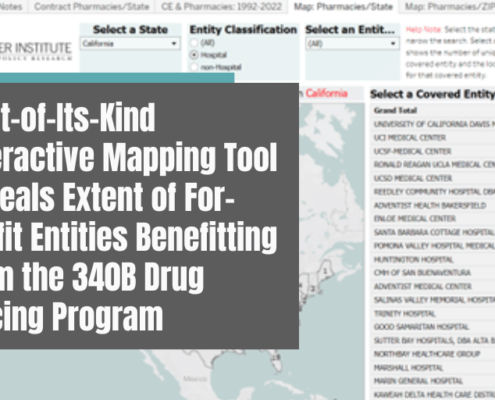
First-of-Its-Kind Interactive Mapping Tool Reveals Extent of For-Profit Entities Benefitting from the 340B Drug Pricing Program
Today, Pioneer Institute released a first-of-its-kind, 50-state mapping tool and database highlighting the troubling way in which hospitals and covered entities leverage unlimited pharmacy contracts under the 340B Drug Pricing Program.
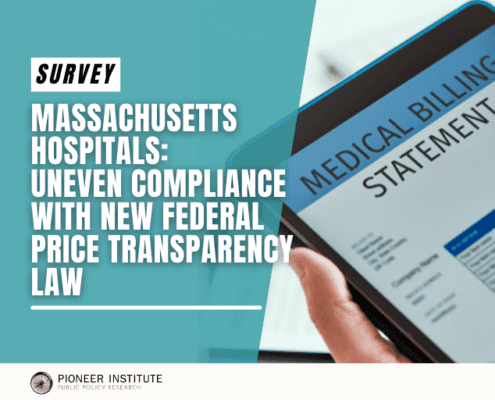
Survey Finds Spotty Compliance Among Hospitals with Federal Price Transparency Law
A 2019 federal law requires hospitals to make prices for 300 shoppable services available online in a “consumer-friendly format,” but a Pioneer Institute survey of 19 hospitals finds that information on discounted cash prices—the price most likely to be charged to consumers paying out of pocket—was unavailable at seven of those hospitals.
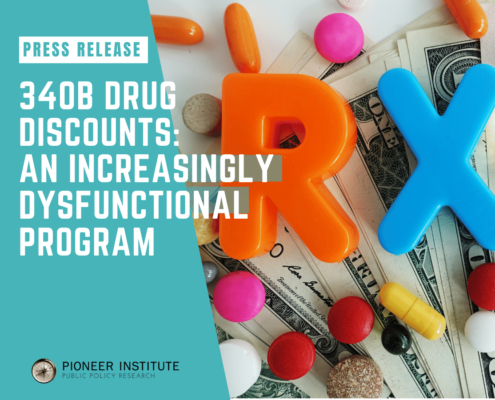
Massachusetts Hospitals Pull Back on Charity Care as Revenue from Federal 340B Drug Discount Program Explodes
Over the past decade, the revenue for hospitals generated by the federal 340B drug discount program, initially intended to serve low-income, uninsured populations, has exploded even while a number of important Massachusetts hospitals have reduced the level of charity care they provide, according to a new study published by Pioneer Institute. The Pioneer Institute study, “340B Drug Discounts: An Increasingly Dysfunctional Program,” notes that nationwide, 340B drug sales rose from $9 billion in 2014 to $38 billion in 2020.

The Promise and Challenges of Rare Cancer Treatments
Dr. William Smith, Pioneer Institute's Visiting Fellow in Life Sciences, spoke about the challenges and opportunities for rare cancer treatments, in a video interview produced by Rare Cancers, a patient group based in Australia, for the November 26th CAN Forum.

Study: Decline in Cardiovascular Health Screenings During COVID-19 Pandemic Poses New Public Health Threat
Pioneer Institute today released a new analysis focused on cardiovascular disease, An “Impending Tsunami” in Mortality from Traditional Diseases?, that examines how the COVID-19 pandemic has created another unrelated public health crisis. The Pioneer analysis examines how a single-minded public health focus on COVID-19, social distancing, and lockdowns drove reductions in screenings, diagnoses, and early treatment for complex conditions such as heart disease.
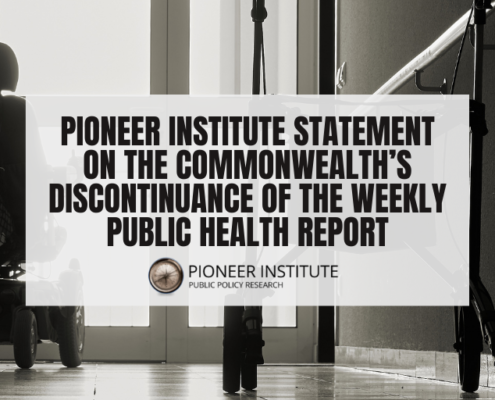
Pioneer Institute Statement on the Commonwealth’s Discontinuance of the COVID-19 Weekly Public Health Report
Useful information about COVID cases or deaths at individual homes has become less available at a time when cases are increasing again, even among vaccinated residents. Pioneer urges Massachusetts to immediately reinstate the so-called Weekly Report, which contains cases and deaths inside individual nursing homes.

Study: Massachusetts Should Retain Additional Healthcare System Flexibility Granted During Pandemic
Massachusetts’ emergency declaration for COVID-19 ends on June 15, and with it some enhanced flexibility that has been allowed in the healthcare system. Some of the added flexibility highlighted barriers that make the system more expensive, harder to access and less patient-centered, and the Commonwealth should consider permanently removing these barriers, according to a new study published by Pioneer Institute.

Study Calls for Better Reporting on Impact of COVID-19 in Eldercare Facilities
Over time, the Massachusetts Executive Office of Health and Human Services and Department of Public Health (DPH) have improved reporting about cases and deaths from COVID-19 in state-regulated eldercare facilities, but flaws and omissions remain and should be corrected, according to a new study published by Pioneer Institute.

New Analysis: ICER Framework Ignores Patient Preferences, Innovation & Societal Benefits in Evaluating Cost-Effectiveness of New Cancer Treatments
Pioneer Institute today released a new analysis, The QALY and Cancer Treatments: An Ill-Advised Match, that examines the alarming methodological and contextual shortcomings of the Quality Adjusted Life Years (QALY)-based methodology in evaluating new cancer therapies. The Pioneer Institute analysis reveals five specific problems with ICER’s evaluation of cancer treatments and demonstrates the urgent need to prohibit the use of the QALY amid trends in rapid cancer innovations and personalized medicine.
Study: Massachusetts Should Embrace Direct Healthcare Options
Especially in the COVID era, many are looking to alleviate the increased burden on the healthcare system. One solution is direct healthcare (DHC), which can provide more patient-centered care at affordable prices and is an effective model to increase access to care for the uninsured, underinsured and those on public programs like Medicaid, according to a new study published by Pioneer Institute.

Survey: Consumers Want Healthcare Price Information, But Few Realize It’s Available
Great strides have been made to increase healthcare price transparency through online cost estimator tools and a state law that requires providers to give out price information. Yet despite the eagerness of consumers to access prices and out-of-pocket costs, many are unaware that such information is available and don’t know how to access it, according to survey results published by Pioneer Institute.

Study: Growth of Antibiotic-Resistant Infections Could Have Massive Human, Financial Costs
The world was blindsided by COVID-19, but a new Pioneer Institute study finds that even as we continue to wrestle with the pandemic, another threat looms that scientists have long known about but the nation has thus far failed to address: the growth of antibiotic-resistant infections.
“Market dysfunction and perverse Medicare reimbursement rates have led to a growth in infections that resist antibiotics,” said Gunnar Esiason, author of “Antimicrobial Resistance: Learning from the current global health crisis to prevent another one.” If we don’t solve this problem, the human and economic costs are likely to be astronomical.”

Study: Growing Drug Rebates Hurt Both Consumers and Healthcare System
Ever-larger rebates are distorting the market for branded drugs and producing outcomes that often benefit neither consumers nor the healthcare system, according to a new study published by Pioneer Institute.
Study: Shift from Highest-Priced Healthcare Providers Would Generate Tremendous Savings
Consumers in just one Massachusetts county could have saved nearly $22 million in a single year and $116.6 million adjusted for inflation over four years if they switched from using the most expensive providers for 16 shoppable healthcare services to those whose prices were closer to average, according to a new study published by Pioneer Institute.

Pioneer Urges Future COVID-19 Study and Recommendations Task Force to Consider Impact on Nursing Home Residents
After over 5,000 people have died of COVID-19 in Massachusetts nursing homes, Pioneer Institute is issuing an open letter to the state’s future COVID-19 health equity task force that outlines an extensive list of recommendations on infection control and preparedness in eldercare facilities.

Open Letter: COVID-19 Study and Recommendations Task Force Established Pursuant to Massachusetts Bill H.4672
Pioneer hopes the members of this important task force will be appointed as soon as possible and that they will look into recommendations to address Covid-19 among the aged and in the state’s nursing homes. Read our Open Letter.
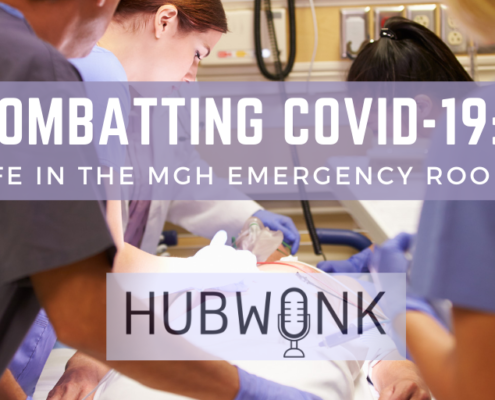
Combatting COVID-19: Life in the MGH Emergency Room
Join host Joe Selvaggi and Pioneer Senior Fellow Josh Archambault as they talk with Dr. David King about the experience of being in emergent care during a pandemic and lockdown. They explore the challenges of coping with a poorly understood virus during a lockdown, all while continuing to serve the sick.

Study Finds Pandemic Likely to Negatively Impact Biopharmaceutical Sector
Contrary to conventional wisdom that says the coronavirus pandemic will generally benefit biopharmaceutical companies, a new Pioneer Institute study finds many companies will emerge from the pandemic commercially weaker, dealing with delays in new product launches and with fewer resources to invest in research and development.

National Study Finds Most States Lack Healthcare Price Transparency Laws
At a time when the coronavirus pandemic has caused massive shifts in state policies on telehealth and scope of practice in healthcare, a new Pioneer Institute study underscores that most of the 50 states continue to suffer from weak laws regarding price transparency. The study identified states that have laws that require carriers, providers or both to provide personalized cost information to consumers before obtaining healthcare services. Fully 33 states placed in the lowest of the three broad analytic tiers on the strength of their state healthcare transparency laws.

A Tipping Point for Telehealth – Bringing Healthcare into Your Home
This week on "Hubwonk," Joe Selvaggi and Josh Archambault talk with Dr. Roy Schoenberg, Chief Executive of Amwell, a global telehealth technology company headquartered in Boston, about the promise of telemedicine and how the COVID-19 pandemic has catalyzed broader adoption.

New Study Calls for Re-thinking Massachusetts’ COVID-19 Care Standards
Pioneer's new study raises concerns about the Massachusetts Department of Public Health’s (DPH’s) Crises Standards of Care (CSC) issued earlier this month, which bear the earmarks of a state bureaucratic effort and should be rethought under a process that includes a thorough vetting by Massachusetts citizens.

New Report: Quality Adjusted Life Years (QALY) Methodology Discriminates Against Older Americans, Threatens to Deny Seniors Access to Life-Saving Care
New report asserts that with older americans more vulnerable during the COVID-19 pandemic, all health plans should avoid using the QALY methodology when assessing the value of care for older patients
